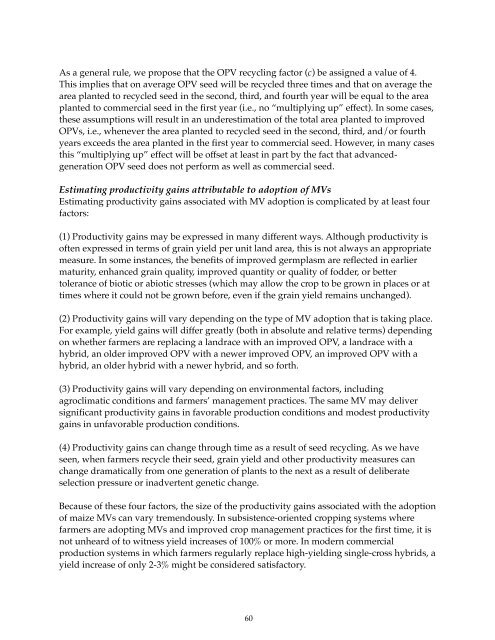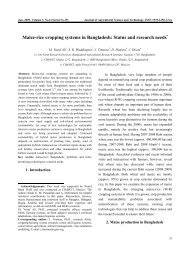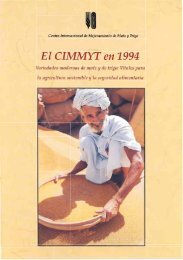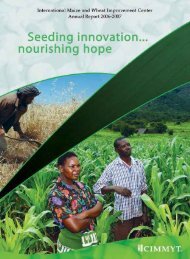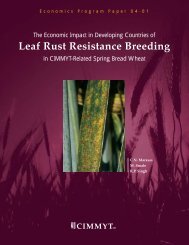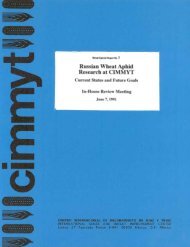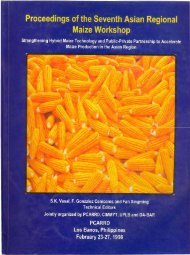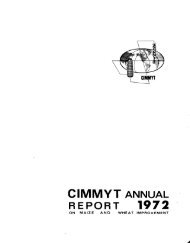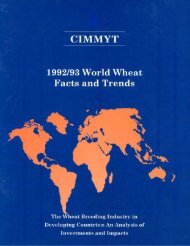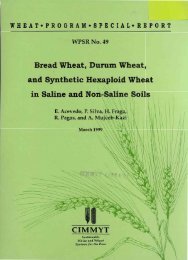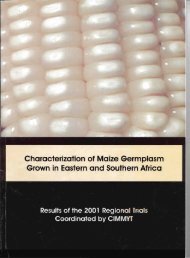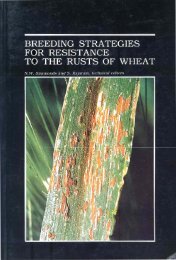It is important to understand that <strong>the</strong>re is nothing magic about <strong>the</strong>se proposed rules <strong>of</strong>thumb. Quite <strong>the</strong> opposite; <strong>the</strong>y are in a sense ra<strong>the</strong>r arbitrary. But arbitrariness isinevitable, at least as long as farmers continue to recycle seed. Given that maize plantsgrown from recycled seed will tend to have diverse genetic backgrounds, “improved” and“unimproved” will rarely represent discrete, mutually exclusive categories; ra<strong>the</strong>r,“improved” and “unimproved’ will almost always be matters <strong>of</strong> degree. Thus, it isunreasonable to expect to come up with objective criteria for defining improved andunimproved germplasm, and <strong>the</strong> best we can hope for is to establish some workable set <strong>of</strong>rules for distinguishing between <strong>the</strong> two. Based on <strong>the</strong> many empirical studies reviewed inthis paper, we believe <strong>the</strong> rules we have proposed constitute such a set.Two types <strong>of</strong> information are needed to implement <strong>the</strong>se proposed rules <strong>of</strong> thumb:(1) information on <strong>the</strong> area planted to each type <strong>of</strong> cultivar (landraces, improved OPVs,hybrids) and (2) information on farmers’ seed (particularly <strong>the</strong> source <strong>of</strong> <strong>the</strong> seed and, if it isrecycled seed, <strong>the</strong> number <strong>of</strong> times it has been recycled). In many countries, <strong>the</strong> first type <strong>of</strong>information is regularly collected through periodic farm-level surveys and published in<strong>of</strong>ficial crop reporting bulletins. Although <strong>the</strong> second type <strong>of</strong> information is rarely availablein published form, it is relatively easy to obtain by interviewing farmers.In cases when <strong>the</strong>se two types <strong>of</strong> information are not available, it may be possible toimplement <strong>the</strong> proposed rules <strong>of</strong> thumb indirectly by using a third type <strong>of</strong> information,namely, information about commercial seed sales. Although data on commercial seed salesare not always published, particularly in countries where <strong>the</strong> private sector is active in <strong>the</strong>seed industry, it is <strong>of</strong>ten easier to survey seed organizations than to conduct a large number<strong>of</strong> detailed farm-level adoption surveys.Assuming data are available on commercial sales <strong>of</strong> hybrid seed within a given period, <strong>the</strong>n<strong>the</strong> area planted to hybrids in that period can be calculated as follows:A hybrid= S hybrid/ r hybrid(A2)where:A hybrid= area planted to hybrid maize,S hybrid= commercial sales <strong>of</strong> hybrid maize seed , andr hybrid= average hybrid maize seeding rate.Similarly, assuming data are available on commercial sales <strong>of</strong> OPV seed within a givenperiod, <strong>the</strong>n <strong>the</strong> area planted to hybrids in that period can be calculated as follows:A OPV= ( S OPV/ r OPV) *c(A3)where:A OPV= area planted to improved OPVs,S OPV= commercial sales <strong>of</strong> improved OPV seed,r OPV= average seeding rate for improved OPVs, andc = OPV recycling factor.59
As a general rule, we propose that <strong>the</strong> OPV recycling factor (c) be assigned a value <strong>of</strong> 4.This implies that on average OPV seed will be recycled three times and that on average <strong>the</strong>area planted to recycled seed in <strong>the</strong> second, third, and fourth year will be equal to <strong>the</strong> areaplanted to commercial seed in <strong>the</strong> first year (i.e., no “multiplying up” effect). In some cases,<strong>the</strong>se assumptions will result in an underestimation <strong>of</strong> <strong>the</strong> total area planted to improvedOPVs, i.e., whenever <strong>the</strong> area planted to recycled seed in <strong>the</strong> second, third, and/or fourthyears exceeds <strong>the</strong> area planted in <strong>the</strong> first year to commercial seed. However, in many casesthis “multiplying up” effect will be <strong>of</strong>fset at least in part by <strong>the</strong> fact that advancedgenerationOPV seed does not perform as well as commercial seed.Estimating productivity gains attributable to adoption <strong>of</strong> MVsEstimating productivity gains associated with MV adoption is complicated by at least fourfactors:(1) Productivity gains may be expressed in many different ways. Although productivity is<strong>of</strong>ten expressed in terms <strong>of</strong> grain yield per unit land area, this is not always an appropriatemeasure. In some instances, <strong>the</strong> benefits <strong>of</strong> improved germplasm are reflected in earliermaturity, enhanced grain quality, improved quantity or quality <strong>of</strong> fodder, or bettertolerance <strong>of</strong> biotic or abiotic stresses (which may allow <strong>the</strong> crop to be grown in places or attimes where it could not be grown before, even if <strong>the</strong> grain yield remains unchanged).(2) Productivity gains will vary depending on <strong>the</strong> type <strong>of</strong> MV adoption that is taking place.For example, yield gains will differ greatly (both in absolute and relative terms) dependingon whe<strong>the</strong>r farmers are replacing a landrace with an improved OPV, a landrace with ahybrid, an older improved OPV with a newer improved OPV, an improved OPV with ahybrid, an older hybrid with a newer hybrid, and so forth.(3) Productivity gains will vary depending on environmental factors, includingagroclimatic conditions and farmers’ management practices. The same MV may deliversignificant productivity gains in favorable production conditions and modest productivitygains in unfavorable production conditions.(4) Productivity gains can change through time as a result <strong>of</strong> seed recycling. As we haveseen, when farmers recycle <strong>the</strong>ir seed, grain yield and o<strong>the</strong>r productivity measures canchange dramatically from one generation <strong>of</strong> plants to <strong>the</strong> next as a result <strong>of</strong> deliberateselection pressure or inadvertent genetic change.Because <strong>of</strong> <strong>the</strong>se four factors, <strong>the</strong> size <strong>of</strong> <strong>the</strong> productivity gains associated with <strong>the</strong> adoption<strong>of</strong> maize MVs can vary tremendously. In subsistence-oriented cropping systems wherefarmers are adopting MVs and improved crop management practices for <strong>the</strong> first time, it isnot unheard <strong>of</strong> to witness yield increases <strong>of</strong> 100% or more. In modern commercialproduction systems in which farmers regularly replace high-yielding single-cross hybrids, ayield increase <strong>of</strong> only 2-3% might be considered satisfactory.60
- Page 1 and 2:
E C O N O M I C SWorking Paper 99-0
- Page 3 and 4:
CIMMYT (www.cimmyt.mx or www.cimmyt
- Page 5 and 6:
Executive SummaryThis paper summari
- Page 7 and 8:
AcknowledgmentsAny report that is b
- Page 9 and 10:
followed a very different path comp
- Page 11 and 12:
Farmers’ Management of Maize Vari
- Page 13 and 14:
In recent years, new evidence has e
- Page 15 and 16: state of Guanajuato and discusses t
- Page 17 and 18: Based on the results of a survey co
- Page 19 and 20: elied with greater frequency on the
- Page 21 and 22: hybrid seed. Initially, it was gene
- Page 23 and 24: In Veracruz State, Mexico, where mo
- Page 25 and 26: Recent work in the highlands of Mex
- Page 27 and 28: producers) tend to rely on family,
- Page 29 and 30: Unintentional seed mixingUnintentio
- Page 31 and 32: Table 11. Yield depression resultin
- Page 33 and 34: Genetic driftWhen farmers select ea
- Page 35 and 36: (a) Production of a single-cross hy
- Page 37 and 38: Breeding hybrid maize begins with t
- Page 39 and 40: According to this theory, genes tha
- Page 41 and 42: Wright’s finding, which is based
- Page 43 and 44: Similarly, the mean of F3 generatio
- Page 45 and 46: 2. Between the F1 and F2 generation
- Page 47 and 48: In a series of on-station trials co
- Page 49 and 50: As part of the same trial, Ramírez
- Page 51 and 52: Table 19. Inbreeding depression obs
- Page 53 and 54: to 41% for the single cross (Figure
- Page 55 and 56: DiscussionEvery time a farmer recyc
- Page 57 and 58: The finding that genetic change in
- Page 59 and 60: Brennan, J.P., and D. Byerlee. 1991
- Page 61 and 62: Murillo Navarrete, P. 1978. Estimac
- Page 63 and 64: AppendixGuidelines for Estimating t
- Page 65: exactly how different the plants wo


